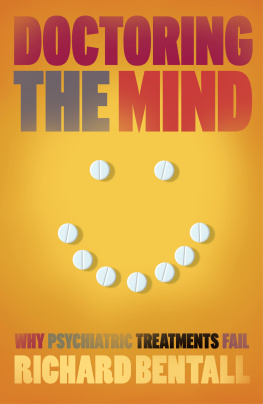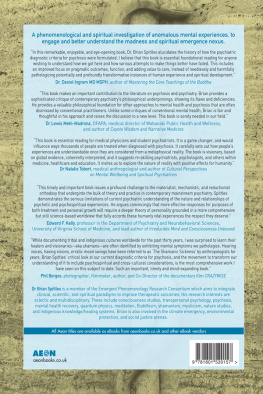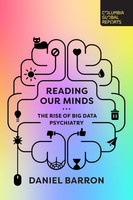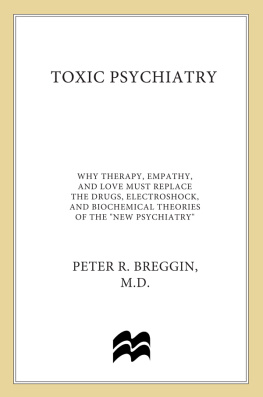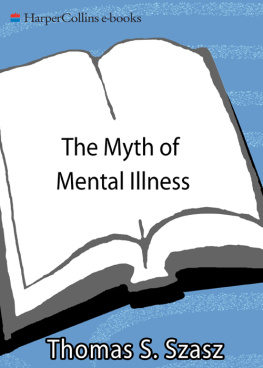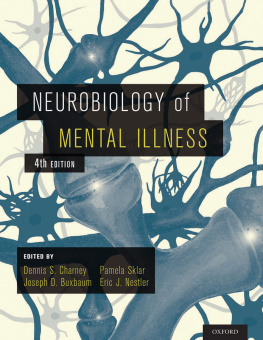RICHARD P. BENTALL
Doctoring the Mind
Why Psychiatric Treatments Fail

ALLEN LANE
an imprint of PENGUIN BOOKS
This book is dedicated to
Sarah Butler
sister and friend
ALLEN LANE
Published by the Penguin Group
Penguin Books Ltd, 80 Strand, London WC2R 0RL , England
Penguin Group (USA) Inc., 375 Hudson Street, New York, New York 10014, USA
Penguin Group (Canada), 90 Eglinton Avenue East, Suite 700, Toronto, Ontario, Canada M4P 2Y3
(a division of Pearson Penguin Canada Inc.)
Penguin Ireland, 25 St Stephens Green, Dublin 2, Ireland
(a division of Penguin Books Ltd)
Penguin Group (Australia), 250 Camberwell Road, Camberwell, Victoria 3124, Australia
(a division of Pearson Australia Group Pty Ltd)
Penguin Books India Pvt Ltd, 11 Community Centre, Panchsheel Park, New Delhi 110 017, India
Penguin Group (NZ), 67 Apollo Drive, Rosedale, North Shore 0632, New Zealand
(a division of Pearson New Zealand Ltd)
Penguin Books (South Africa) (Pty) Ltd, 24 Sturdee Avenue, Rosebank, Johannesburg 2196, South Africa
Penguin Books Ltd, Registered Offices: 80 Strand, London WC2R 0RL , England
www.penguin.com
First published 2009
Copyright Richard P. Bentall, 2009
The moral right of the author has been asserted
All rights reserved
Without limiting the rights under copyright
reserved above, no part of this publication may be
reproduced, stored in or introduced into a retrieval system,
or transmitted, in any form or by any means (electronic, mechanical,
photocopying, recording or otherwise) without the prior
written permission of both the copyright owner and
the above publisher of this book
ISBN: 978-0-14-191783-2
List of Illustrations
Photographic acknowledgements are given in parentheses.
List of Figures
The possible evolution of paranoid beliefs (adapted from D. Freeman and R. P. Bentall (eds.) (2008), Persecutory Delusions: Assessment, Theory and Treatment (Oxford University Press, 2008))
A model of paranoia (adapted from R. P. Bentall and C. Fernyhough (2008), Social predictors of psychotic experiences: Specificity and psychological mechanisms, Schizophrenia Bulletin, 34, 100911)
A model of auditory hallucinations (adapted from R. P. Bentall and C. Fernyhough (2008), Social predictors of psychotic experiences: Specificity and psychological mechanisms, Schizophrenia Bulletin, 34, 100911)
CONSORT diagram (adapted from N. Tarrier, S. Lewis, G. Haddock, R. P. Bentall, R. Drake, G. Dunn, et al. (2004) 18-month follow-up of a randomized controlled trial of cognitive-behaviour therapy in first episode and early schizophrenia, British Journal of Psychiatry, 184: 2319)
Acknowledgements
As usual I must thank my numerous postgraduate students and colleagues in clinical psychology and psychiatry for stimulating my thinking about the issues discussed in the following chapters. Of my current and recent postgraduates, I would like to mention Eve Applegate, Hazel Dunn, Paul French, Becca Knowles, Sara Melo, Michael Moutoussis, Justin Thomas, Alisa Udachina and Filippo Verase. Of my colleagues I would like to mention, in clinical psychology, Tony Morrison, Mike Jackson, Steve Jones, John Read and Sara Tai, in biomedical statistics Graham Dunn, Chris Roberts, Paula Williamson and Gill Lancaster, and, in psychiatry, Shn Lewis, David Kingdon, David Linden, Richard Morriss, Jan Scott and Richard Drake (who, I guess, would disagree with much of what I have written but who seem to be relaxed about collaborating with someone who has one foot in the antipsychiatry camp). I would also like to thank my assistant Hanneke Booij for keeping me organized during my first extremely busy year at Bangor. A special mention should also be given to Pete Saunders of PCCS Books (a small publishing house specializing in books about psychotherapy) for alerting me to the contribution of Carl Rogers, which has almost been forgotten by most clinical psychologists. Self-evidently, none of these people should be held in any way responsible for any errors I have made. Perhaps one of the greatest joys of an academic life is that it allows one to work in friendly cooperation with talented people whose views on important issues are often completely different from ones own.
I would like to thank my wife Aisling, a clinical psychologist who works in an early intervention service, for her support and for endless discussions about service users, their problems and their aspirations. I would also like to thank my children Fintan and Keeva for putting up with my occasional grumpiness during the writing of this book. My sister and brother-in-law Deirdre and Steven OConnor are to be thanked for wining and dining me while I was welded to my laptop during visits to Mullingar. My good friend and collaborator Charles Fernyhough is to be thanked for coming up with the title of the book after a mere second of thought; I had been struggling with the problem for months. I would also like to thank the helpful and constructively critical team at Penguin Books, especially Helen Conford, who has the patience of several saints.
Finally, I must offer my thanks to the numerous service users who have taught me most of what I know about psychosis, and especially those who have consented to me including their (necessarily heavily disguised) stories in these pages. I suspect that the time we have spent together has often been of more benefit to me than to them.
Richard Bentall
November 2008
Preface: Rational Antipsychiatry
Several years ago I was invited to give a talk at a conference held for the lay people and professionals who sit on the British National Health Services numerous research ethics committees. These committees, which meet in every corner of the country, are responsible for regulating the conduct of medical research. Any investigator who wishes to carry out a study in the NHS is required to submit detailed plans to the local committee, which will then debate the merits of the proposed investigation, ensure that any risks to patients are outweighed by likely benefits, and make sure that that all those participating freely consent to doing so.
I had been invited to talk at the conference because the organizers thought that, during two decades of work as a clinical psychologist studying severe mental illness, I was likely to have gained some insights into the specific problems encountered when trying to conduct research with psychiatric patients. The conference was scheduled to take place in the city of Chester, about 20 miles from my home, so I had reluctantly agreed to give my talk early on a Saturday morning, a time I normally prefer to spend with my family. As I made my way to the conference venue my mind was focused on a less cerebral purpose I had discovered that the film ET was going to be shown at a local cinema later in the morning and that, if I managed to leave promptly after my talk, I would be able to take my 5-year-old twins to see it.
When I arrived I found about a hundred delegates sitting behind long tables draped in white cloth. They looked like fairly ordinary folk and I reminded myself that they would be from a variety of backgrounds; quite a few doctors no doubt, a few professional philosophers, as well as many people from other walks of life. They were listening respectfully to a smartly dressed young surgeon who, from his position on the podium, was enthusiastically berating them. Although I had missed the first few minutes of his talk, his theme seemed to be that, by requiring the detailed scrutiny of every aspect of a proposed project, a process that could take many months, ethics committees were in danger of preventing vital research from happening at all. (Anyone who has tried to conduct research in the NHS is likely to have some sympathy with this position although, of course, this is not to suggest that research projects should not be subject to detailed independent review.)

